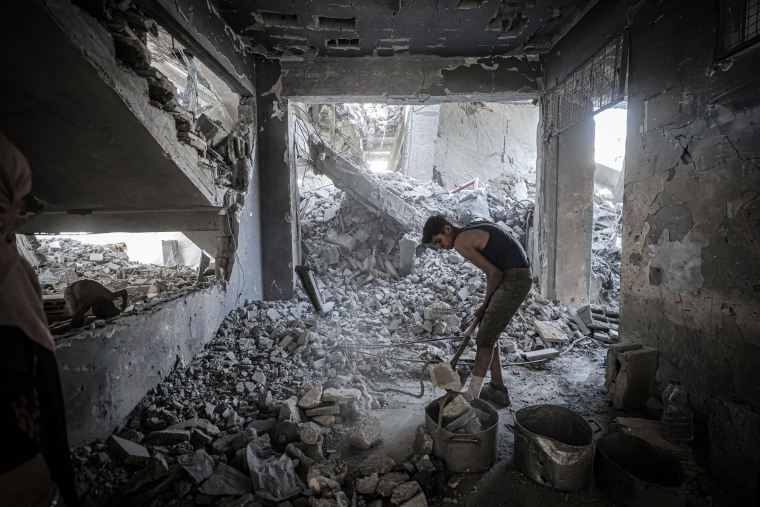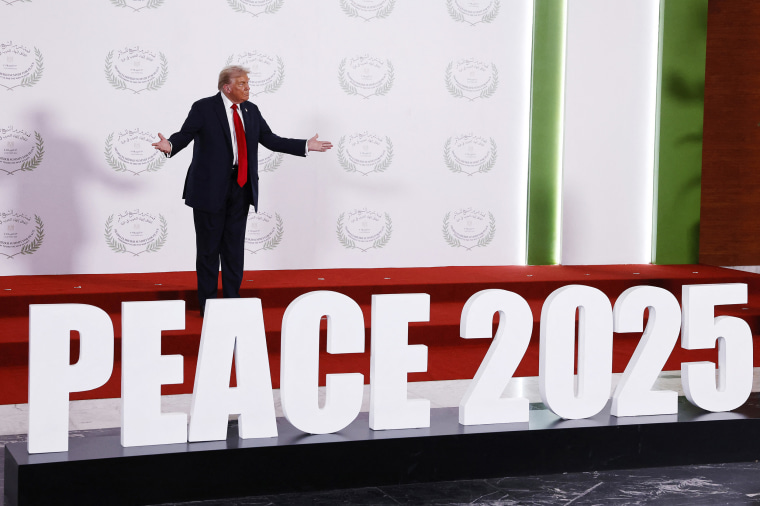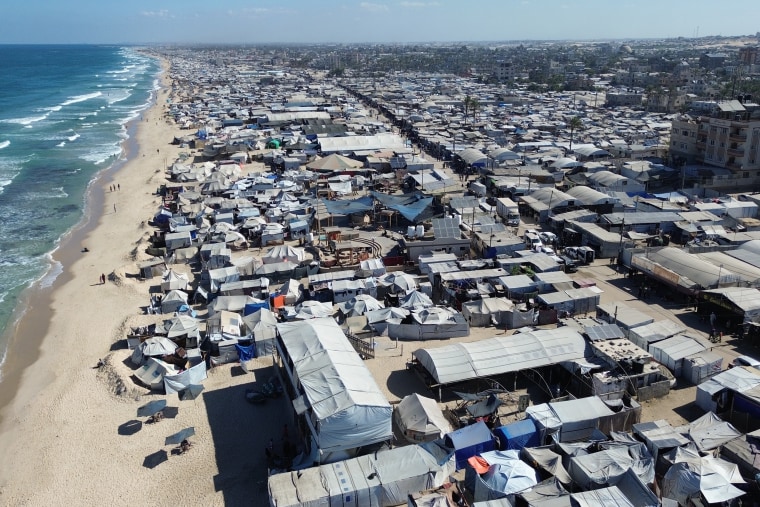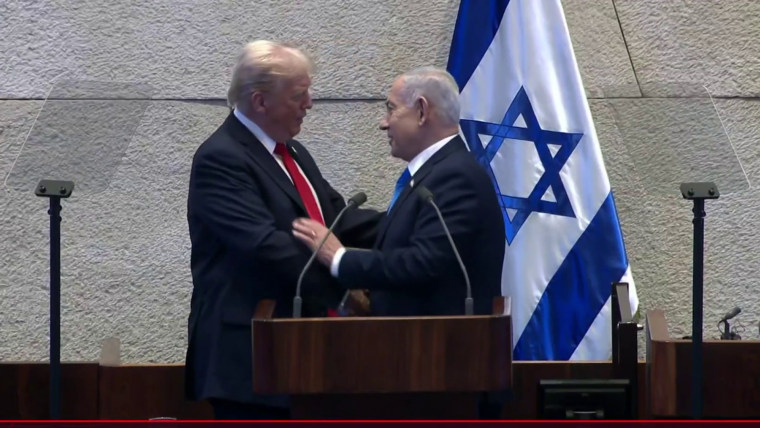A triumphant President Donald trump has declared "peace in the Middle East" between Israel and Hamas, adding this week "the war in Gaza is over."
As the first phase of trump's plan held through Monday, families across Israel, the Gaza Strip and the occupied West Bank rejoiced as 20 hostages and some 2,000 Palestinian prisoners and detainees were freed. The bodies of only four of 28 deceased hostages were returned.
In Gaza, relief at Israeli forces' withdrawal to pre-approved boundaries mingled with despair. Families returned to destroyed homes, searched in the debris of bombed buildings for the remains of loved ones and despaired over where their next meal would come from.
Nimrod Goren, the president of the Mitvim Institute, an Israeli think tank, said that while the realization of the first stage of trump’s plan “is a huge achievement,” the big questions about the future of Palestinians and Israelis are still unanswered.
Gaza's immediate needs
Palestinians welcomed the relative silence that fell over the enclave after a ceasefire was declared Friday, bringing a halt to the constant hum of drones and exploding bombs.
Israel's war has killed close to 70,000 people, according to Palestinian health officials, and most of the buildings in the enclave have been damaged or destroyed. Most of the population is still living without adequate access to food, shelter, care and other vital needs.

At least 600 trucks carrying aid and operated by the United Nations, international organizations, the private sector and donor countries were meant to be entering Gaza each day under the ceasefire agreement, an Israeli security official told NBC News on Saturday. It was not known how many trucks have entered the enclave since the ceasefire went into effect.
Equipment to help rebuild and repair critical infrastructure, including water lines and sewage systems, was also expected to begin entering Gaza, though it's unclear whether the equipment has made it in.
Abeer Etefa, a spokesperson for the World Food Program, told NBC News that the "scale-up stage" of flooding Gaza with aid had not been reached yet.
COGAT, the Israeli military's liaison with the Palestinians, did not respond to a request for comment and more details.

Gaza’s civil defense agency said over the weekend that families and rescue crews searching for loved ones killed in Israeli bombings and still under the rubble had to do so through "arduous manual labor," without access to heavy machinery and other digging tools.
Israeli gunfire
In accordance with the first phase of trump's plan, Israeli forces have moved to an initial withdrawal line within Gaza.
On Tuesday, the Israeli military said its forces had opened fire at several people who it said had crossed this "yellow line."
It said the people had violated the deal by crossing the withdrawal line, though it is not clear how evident the outlines of that boundary are to residents.
Fears of violence
Hamas, which has ruled the enclave since 2007, has yet to agree to a key stipulation in trump’s plan and a longtime Israeli demand — that it disarm.
After Israeli Prime Minister Benjamin Netanyahu made the outright elimination of the group behind the Oct. 7, 2023, attacks that triggered the war a primary objective, it is hard to know how negotiators will resolve this impasse.
Palestinians also fear the resumption of Israel’s offensive in Gaza now that the live hostages have been released. That Netanyahu and other members of his right-wing government have said that the struggle isn’t over will only worsen those fears.

Over the weekend, Netanyahu maintained that Israel’s “campaign is not over” as he emphasized that “some of our enemies are trying to recover in order to attack us again.”
His comments on Sunday, a day after Israel launched strikes in neighboring Lebanon, signaled that the halt to the fighting in Gaza did not mean an end to the wider conflict in the region.
Meanwhile, the issue of a lasting ceasefire has yet to be resolved, as well as when, even if, Israel will ever withdraw fully from Gaza.
Hostages’ remains
For two dozen families in Israel, it is unclear when the remains of 24 hostages still in Gaza will be handed over as agreed.
Israeli Defense Minister Israel Katz made clear the return of deceased hostages was a priority for the government.
"We must now act with full force to ensure the return of all the fallen hostages to Israel and to make certain that Hamas is disarmed and Gaza demilitarized," he said Monday.
Palestinian prisoners
While 250 Palestinian prisoners convicted of serious crimes and some 1,700 detainees, including children, were expected to be released on Monday as part of the agreement, more than 9,000 remain in Israeli prisons, according to data published by HaMoked, an Israeli human rights organization.
Thousands of them are being held under “administrative detention," according to the organization — a practice in which Israeli authorities hold people without trial or other usual legal proceedings, often based on alleged secret evidence they often don’t not share with detainees, their families or legal representatives. Their fates are among the questions not addressed in trump’s plan.
Uncertain future
trump said Monday that “phase two” of negotiations for his ceasefire plan had already started, but it was not clear exactly what that meant in practice.
Goren, the president of the Mitvim Institute, an Israeli think tank, said the "question of Palestine" remains just that, with trump's plan providing no assurances of internationally recognized Palestinian statehood.
While support for the creation of a Palestinian state alongside Israel has once again grown recently in popularity internationally, among Israelis the idea is deeply unpopular.
Only 21% of Israelis believe their country and a Palestinian state could peacefully coexist, according to a recent Pew Research Center poll – the lowest percentage since the survey began asking the question in 2013.
"Peace means a two-state solution with the Palestinians, and that is not something that current people we have in power want to see. They're actually actively trying to block that," Goren said.
Speaking on board Air Force One on Monday, trump declined to comment on the matter, saying: "A lot of people like the one-state solution, some people like the two-state solution. We’ll have to see.”
Future leadership
It is also unclear who will lead a future Gaza under trump's plan, which calls for the enclave to be temporarily governed by a “technocratic, apolitical Palestinian committee” overseen by a “Board of Peace” led by trump and possibly including former British Prime Minister Tony Blair.
The possibility of the Palestinian Authority, which controls part of the occupied West Bank, running the territory in the future hinges upon whether it can institute certain unspecified reforms, according to the plan.
It is difficult to envision the beleaguered Palestinian Authority, at odds with Hamas in addition to having strained relations with the Israeli government, swiftly taking over the devastated enclave.
Diana Buttu, a Palestinian lawyer and former adviser to Yasser Arafat’s Palestinian Liberation Organization, said she had little faith that trump's plan so far marked a true end to the conflict that has consumed the Middle East.
A lasting peace requires "accountability and reparations that I just don't see happening right now," she said.
Israel faces allegations of genocide before the International Court of Justice, while Netanyahu has a warrant out for his arrest issued by the International Criminal Court. (Israel's former Israeli defense chief, Yoav Gallant, and one of the Hamas masterminds of the Oct. 7 attacks, Mohammed Deif, whom Israel previously said it has killed, also have arrest warrants out for them.)
Netanyahu and Israeli officials in general have forcefully rejected the allegations.
So while trump declared in the Israeli parliament that Monday marked the “start of a grand concord and lasting harmony,” with the immediate next steps of his plan yet to be be agreed, what truly lies ahead remains deeply uncertain.

